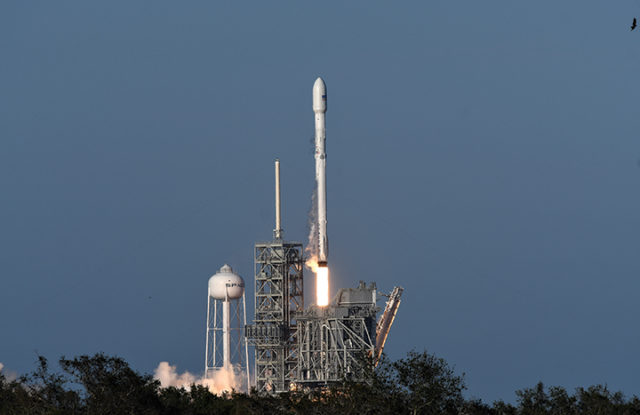Last week, the space transportation company SpaceX made history by launching a commercial satellite using a recycled rocket. The first stage of its two-stage Falcon 9 rocket had been used to launch its CRS-8 mission in April 2016.
The implications of re-utilizing rocket components could help break down financial barriers to space travel, according to Dr. Rene Laufer, an associate research professor with the Baylor Center for Astrophysics, Space Physics and Engineering Research (CASPER) and head of the Space Science Lab. Laufer said SpaceX and similar commercial space flight corporations have worked to combat the expense of space travel.
“Falcon 9 was innovative from the beginning because it was intended to be cheaper,” Laufer said. “Later by reusing the rockets, but they also started out by using the same rocket throughout all of the stages.”
Traditionally, rockets functioned as a “one-time use” product, with the first stage, or booster, rockets being discarded shortly after launch and later stages utilizing different rockets generally entering orbit and then deteriorating upon re-entry, according to NASA’s booster staging information. Falcon 9 is not the first time in the history of space flight that parts have been reused, as NASA’s space shuttles were flown multiple times. However, Laufer said, the cost of retrieval, disassembly, repair and reassembly of components can be just as financially limiting as simply building new parts.
“The first re-launch of the first-stage rockets is historic and will boost the whole industry,” Laufer said. “But the question we will see in a few years will be, ‘Was it cost effective?’”
SpaceX, formally known as the Space Exploration Technologies Corp., has as least thwarted the problem of retrieval, with its Falcon 9 first-stage rockets landing on the autonomous droneship, named Of Course I Still Love You, according to a webcast hosted by the corporation. The brainchild of founder Elon Musk — who also co-founded Tesla, Inc. and Paypal — SpaceX was created in 2002 with its website proclaiming its goal of “enabling people to live on other planets.”
Other commercial spaceflight companies such as Blue Origin and Virgin Galactic host similar goals for space tourism. Like SpaceX, Blue Origin has a famous founder in Amazon CEO Jeff Bezos. Laufer said these smaller, more CEO-focused companies can take risks and make innovations in a conservative and traditionally government-funded field.
“It’s good to have these key figures on both sides say, ‘Let’s take the risk,’” Laufer said. “And SpaceX said, ‘Let’s do it in the way that it should be — Let’s land the rocket the way it launched, upright.’”
Detailed in their mission report, SpaceX’s March 30 Falcon 9 launch delivered a communications satellite for SES, a Luxembourg-based satellite owner. While SpaceX’s latest launch was a success, the company has encountered several setbacks in the past. In June 2015, their CRS-7 mission was set to resupply the International Space Station when it disintegrated shortly after launch due to a strut failure in the liquid oxygen tank, SpaceX released in their CRS-7 Investigation Update. In September 2016, the company shared in a series of “Anomaly Updates” that a communications satellite was destroyed when a Falcon 9 exploded during a routine test for the AMOS-6 mission.
Richard Campbell, a Baylor engineering professor and a member of CASPER, said that despite these issues, SpaceX still has the opportunity to help the industry.
“They’ve had some failures,” Campbell said, “but as engineers, we just view [those failures] as an engineering problem waiting to be fixed.”
The space industry is connected to much of modern technology, with GPS, cellphones and television broadcasting utilizing space-based resources. Growth in the space industry, Campbell said, will benefit everybody by creating jobs, sources of renewable energy and potentially allowing for future space tourism and colonization.
“The reason you have a powerful computer you can hold in your hand is that we had to make things lighter and smaller to get them into space,” Campbell said. “Everybody should want to encourage these endeavors.”



